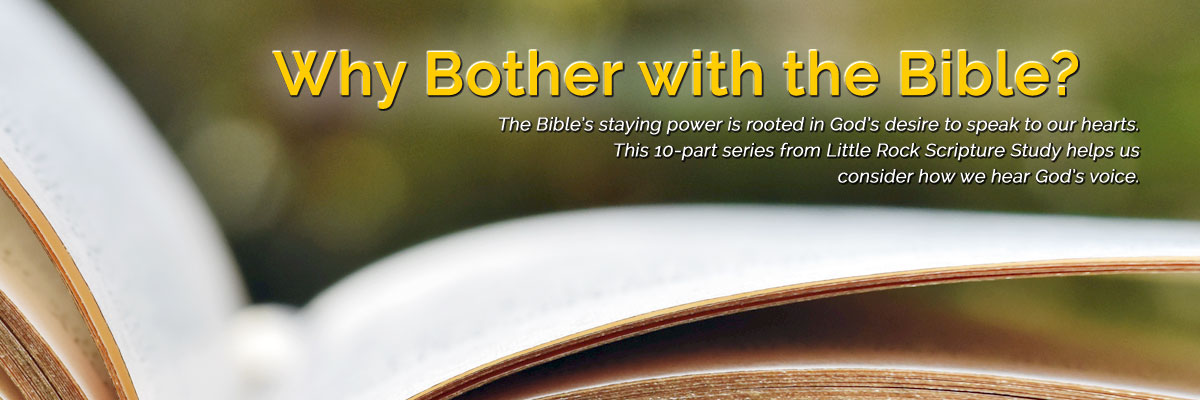Official Website of the
Catholic Diocese of Little Rock
God’s word reveals our identity and our destiny
Published: May 12, 2018
This is the fourth column in a 10-part series.
By Cackie Upchurch
Director of Little Rock Scripture Study
When we meet someone at a social event, one of the first questions we ask is usually “What do you do?” or “Where do you work?” Sometimes these kinds of conversations feel shallow. We know that our occupations do not define us. There is so much more to each of us than “what we do” for a living.
 While a party or a conference may not be the place to explore the deeper questions, we do long to know who we are in a meaningful way, to be known for our deeper identity, and even to know where we are going. These longings get to the heart of what it means to be human, and what it means to be the particular human that each of us is.
While a party or a conference may not be the place to explore the deeper questions, we do long to know who we are in a meaningful way, to be known for our deeper identity, and even to know where we are going. These longings get to the heart of what it means to be human, and what it means to be the particular human that each of us is.
As Christians, we are no different than anyone else in our search for meaning and personal identity and destiny. But, as Christians, we have at our disposal the guiding testimony of the Scriptures. It is within these sacred stories and teachings that we begin to uncover who we are and where we are bound.
Our Bible opens with two accounts of creation. The writers offer testimony to their encounter with the God of creation who fashioned the very earth and all that is in it. These accounts do not intend to describe exactly when or how we came into being as much as they testify to the reality of God’s creative work in the world.
A constant refrain throughout the first chapter of Genesis is: “God saw that it was good.” The world was teeming with life, crowned by the creation of human beings, made in God’s very image (Gen 1:27). Being made in God’s image means that we have within us a share or spark of divinity, and that wherever we go, we take God with us.
The psalmist reflects on God’s loving and creative acts with awe and wonder: “When I look at your heavens, the work of your fingers, the moon and the stars that you have established; what are human beings that you are mindful of them, mortals that you care for them? Yet you have made them a little lower than God, and crowned them with glory and honor” (Ps 8:3-5).
If our identity is rooted in this understanding of a God who lovingly fashioned us to bear the divine presence in our world, we recognize within ourselves a sense of our remarkable dignity.
Our identity is also tied to a dynamic relationship with the God who knows and loves us. Again, the words of a psalm capture some of this intimate knowing: “You formed me in my inmost being; you knit me in my mother’s womb. I praise you, because I am wonderfully made … My very self you know” (Ps 139:13-14). Our Creator knows us best.
When Paul wrote to the Corinthians he reminded them of God’s words, “I will be a father to you, and you shall be sons and daughters to me, says the Lord Almighty” (2 Cor 6:18, referencing 2 Sam 7:14; Psalm 2:7; Isa 43:6 and Jer 31:9).
We are assured that followers of Jesus are children of God, intimately joined to God who allows us to call him “Abba, Father” (see John 1:12; Rom 8:14-15; Gal 4:7). A deep sense of belonging shapes our identity and gives us the grace to accept our high calling.
Throughout the Bible we find stories of God’s call in the lives of ordinary people who then did extraordinary things in God’s name. Moses went from being a shepherd on the run to a liberating force for those enslaved in Egypt; the prophets were farmers and herdsmen and teachers who became God’s mouthpiece demanding justice and announcing mercy; Esther was a Jewish woman married off to a Persian ruler who found herself in the position to save her people from slaughter; Mary was a young maiden whose consent to God’s plan led to the birth of God’s son; Paul was an observant Jew who discovered in Jesus the courage to die to self and live for Christ.
Our stories are not yet written in full but our identity is established and our destiny is secure. We can rest assured that, aware of our dignity and bound to a loving God, we will discover our calling and grow in our ability to answer with confidence the questions: “Who am I? What is my destiny?”
Study Questions
- In what circumstances have you found yourself grasping for a greater sense of your personal identity and value?
- How does the proclamation from Genesis 1:27 that we are made in God’s very image strike you? Is it reassuring? Confusing? Does it give you a sense of worth? Do you feel empowered?
- In baptism, we are each identified and claimed as a child of God, an identity that we grow into over the course of our lives. What people or events have helped you to mature in your understanding of being a daughter or son of God? What unique gifts have you been given as part of God’s family?
- Where in our world (or within your daily relationships) do you see evidence of the need for understanding who we are and whose we are?
This article was originally published in Arkansas Catholic May 12, 2018. Copyright Diocese of Little Rock. All rights reserved. This article may be copied or redistributed with acknowledgement and permission of the publisher.




